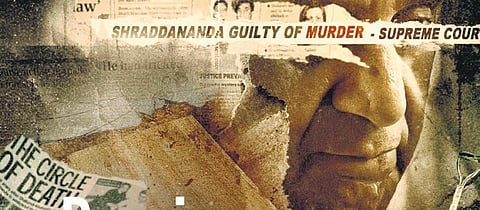

BENGALURU: In the early ’90s, a decade before the IT boom, sleepy and quaint Bengaluru hit the national headlines for the shocking and gruesome murder case of socialite Shakereh Khaleeli, which sent shock waves across the nation. Three decades later, the story is still talked about with a sense of disbelief.
This story of a rich heiress, a self-proclaimed godman, a murder mystery and a family’s fight to dig out the truth will be seen in Amazon Prime Video’s latest crime documentary Dancing on the Grave, which will be out on April 21. London-based filmmaker Patrick Graham, who directed the documentary, recalls the initial feelings of ‘shock, surprise and horror’ when he first read the story.
“We’ve read through thousands of pages of legal documents and have spoken to over 50 people during the research stage. The story itself has so many twists and turns. I didn’t know anything about it while getting into it. I was onboard after reading that document because I was just so transfixed by the story,” says Graham, adding that in the making of the documentary, he has met many who know the family, making it personal to them.
Apart from showing the family’s side of the story, the documentary also shows Murali Manohar Mishra, aka, Swami Shraddhanand, who is currently serving his term in jail. “Mishra is just another perspective within the whole tapestry of all the perspectives and viewpoints that we have in the show. He’s a vital voice, but he’s also one of many vital voices in the show.
His interviews haven’t really been seen previously. We did think it was important to get his voice in as well. We managed to get into the prison, which was an incredibly interesting experience for me and the whole crew that was allowed in there,” says Graham. As an interviewer, it was a sensitive situation for him since the interviewee was ‘a delicate old man’.
“We had to be slightly gentle, but of course, at the back of our minds was this idea that he had been convicted for doing something horrific. It was a bit of a contradiction when we were talking to him because on the one hand, he was presenting himself as a frail old man, and on the other, only a few decades ago, he had been convicted of doing something utterly horrendous,” says Graham.
The team started working on the story in 2019, so Covid came as a spoiler. Since the initial work was research-based, most of the meetings were done virtually. “We had to be mindful when we were shooting the interviews to make sure social distancing was enforced. It was quite a dicey process. And very tragically, there were a few interview subjects who we actually lost just before we could shoot their interviews. It had a profound effect on the project,” says Graham.
Timeline
1965: Shakereh, granddaughter of Sir Mirza Ismail, the Diwan of Mysore, Jaipur and Hyderabad, got married to her first cousin Akbar Mirza Khaleeli
1983: Murali Manohar Mishra, who had renamed himself Swami Shraddhanand first met Shakereh and her husband in Delhi
1985: Shakereh divorced Akbar Mirza Khaleeli after he returned from Iran
1986: In April, six months after her divorce, Shakereh married Shraddhanand, and gave access to her money and property
1991: Sabah, Shakereh’s second daughter, was unable to locate her mother
1992: Sabah filed a complaint at the Ashok Nagar Police Station
1991-94: Shraddhanand pretended Shakereh was on a holiday and lived lavishly in her property
1994: In May, the police finally found the skeletal remains of Shakereh’s body buried deep in the courtyard of her own house. Shakereh was killed on April 28, 1991 after being drugged in her sleep and was then placed on a mattress which was deposited in a coffin-like box.
1997: The case was brought into trial
2005: Shraddhanand was sentenced to capital punishment by hanging
2006: Shraddhanand issued a notice to the Karnataka government questioning the High Court judgment that upheld his death sentence
2008: A life sentence was ordered for Shraddhanand by the Supreme Court of India
He was originally jailed in the central prison in Bengaluru, but was transferred to Sagar Central Jail in 2011 at his own request